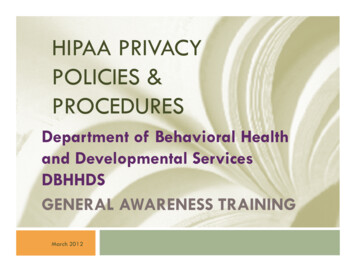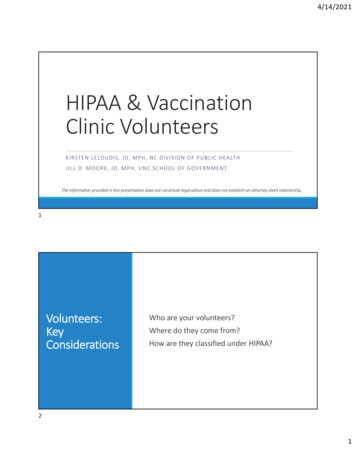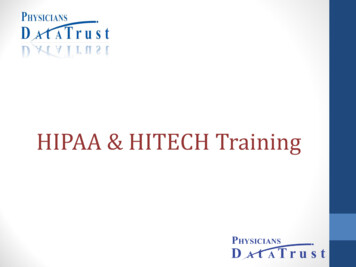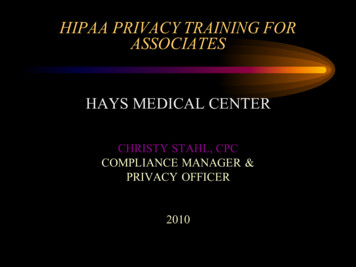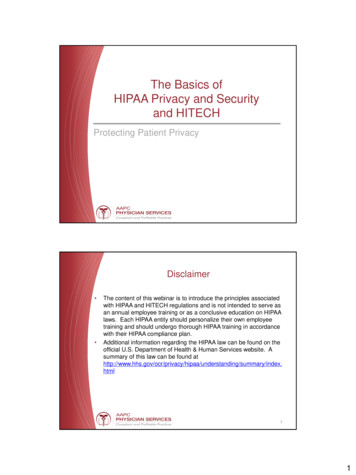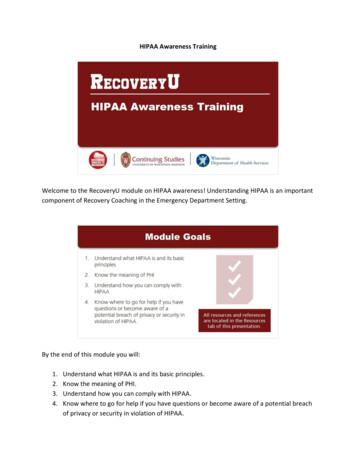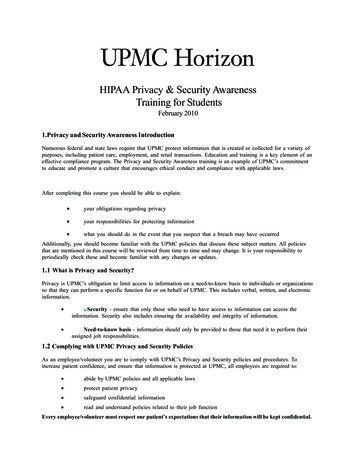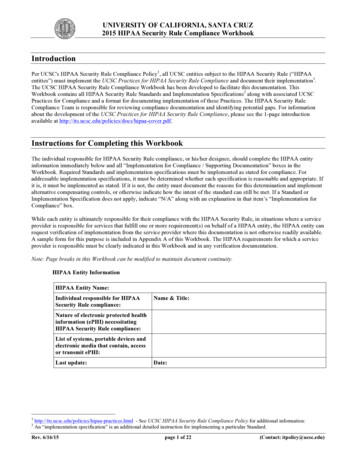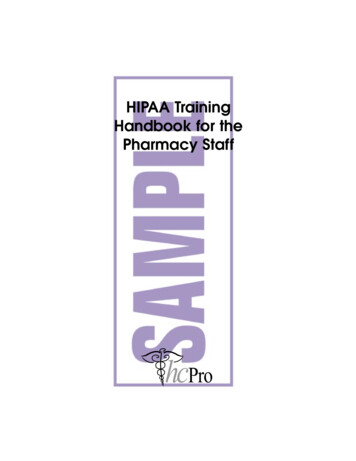
Transcription
HIPAA TrainingHandbook for thePharmacy StaffhcPro
HIPAA Training Handbook for the Pharmacy Staff is published by HCPro, Inc.Copyright 2003 HCPro, Inc.All rights reserved. Printed in the United States of America.ISBN 1-57839-253-5No part of this publication may be reproduced, in any form or by any means,without prior written consent of HCPro or the Copyright Clearance Center(978/750-8400). Please notify us immediately if you have received an unauthorized copy.HCPro provides information resources for the health care industry. A selectedlisting of other newsletters, videos, and books is found at the end of this book.HCPro is not affiliated in any way with the Joint Commission on Accreditation of Healthcare Organizations, which owns the JCAHO trademark.Lauren McLeod, Executive EditorJean St. Pierre, Creative DirectorMike Mirabello, Senior Graphic ArtistPaul Singer, Layout ArtistPaul Nash, Group PublisherSuzanne Perney, PublisherAdvice given is general. Readers should consult professional counsel forspecific legal, ethical, or clinical questions. Arrangements can be made forquantity discounts.For more information, contact:HCProP.O. Box 1168Marblehead, MA 01945Telephone: 800/650-6787 or 781/639-1872Fax: 781/639-2982E-mail: customerservice@hcpro.comVisit HCPro at its World Wide Web sites:www.hcmarketplace.com, www.hcpro.com, www.hcprofessor.com,www.complianceinfo.com, and www.himinfo.com.3/200316774
ContentsAbout the Expert . . . . . . . . . . . . . . . . . . . . . . . . . . . . . . . . vIntended audience . . . . . . . . . . . . . . . . . . . . . . . . . . . . . . 1The basics . . . . . . . . . . . . . . . . . . . . . . . . . . . . . . . . . . . . . 2What is HIPAA? . . . . . . . . . . . . . . . . . . . . . . . . . . . . . . . . . . 2What brought about this law? . . . . . . . . . . . . . . . . . . . . . . . .3What are the consequences for not complying? . . . . . . . . . . .4What’s considered private and confidential? . . . . . . . . . . . . . .5Who is authorized to see information? . . . . . . . . . . . . . . . . . .7Who oversees privacy policies? . . . . . . . . . . . . . . . . . . . . . . .7What if I see someone break the rules? . . . . . . . . . . . . . . . . .8Case #1 . . . . . . . . . . . . . . . . . . . . . . . . . . . . . . . . . . . . . . . .9Case #2 . . . . . . . . . . . . . . . . . . . . . . . . . . . . . . . . . . . . . . . .9Computer systems and electronic transmissionof information . . . . . . . . . . . . . . . . . . . . . . . . . . . . . . . . . . 11Faxes . . . . . . . . . . . . . . . . . . . . . . . . . . . . . . . . . . . . . . . . .11E-mail on the job . . . . . . . . . . . . . . . . . . . . . . . . . . . . . . . . 12Passwords and computer equipment . . . . . . . . . . . . . . . . . .12Helpful hints to use when working with computers . . . . . . .13Case #3 . . . . . . . . . . . . . . . . . . . . . . . . . . . . . . . . . . . . . . .14Case #4 . . . . . . . . . . . . . . . . . . . . . . . . . . . . . . . . . . . . . . .15Case #5 . . . . . . . . . . . . . . . . . . . . . . . . . . . . . . . . . . . . . . .15Case #6 . . . . . . . . . . . . . . . . . . . . . . . . . . . . . . . . . . . . . . .16Case #7 . . . . . . . . . . . . . . . . . . . . . . . . . . . . . . . . . . . . . . .17 2003 HCPro, Inc. Unauthorized duplication is prohibited.iii
HIPAA Training Handbook for the Pharmacy StaffPatient rights . . . . . . . . . . . . . . . . . . . . . . . . . . . . . . . . . . 17Notice of privacy practices . . . . . . . . . . . .Authorization . . . . . . . . . . . . . . . . . . . . . .Authorization exceptions . . . . . . . . . . . . . .Right to access . . . . . . . . . . . . . . . . . . . . .Unreviewable grounds for denial of accessReviewable grounds for denial of access . .Requests for amendments . . . . . . . . . . . . .Accounting of disclosures . . . . . . . . . . . . .Right to complain . . . . . . . . . . . . . . . . . . . . .17. . .19. . .20. . .22. . .24. . .24. . .26. . .27. . .28Final exam . . . . . . . . . . . . . . . . . . . . . . . . . . . . . . . . . . . . 30Answers to the final exam . . . . . . . . . . . . . . . . . . . . . . . . . 35Related products . . . . . . . . . . . . . . . . . . . . . . . . . . . . . . . 36Certificate of completion . . . . . . . . . . . . . . . . . . . . . . . . 42iv 2003 HCPro, Inc. Unauthorized duplication is prohibited.
About the ExpertWalter L. Fitzgerald, Jr.Walter L. Fitzgerald, Jr. received a B.S. degree in pharmacyfrom Mercer University School of Pharmacy in 1979 and anM.S. degree in pharmacy administration in 1982 from theUniversity of Tennessee College of Graduate Health Sciences.In 1983, he received the Juris Doctor degree from theUniversity of Memphis School of Law. Mr. Fitzgerald is alicensed attorney and pharmacist.Mr. Fitzgerald serves as Professor of Pharmacy at the Universityof Tennessee College of Pharmacy. His teaching and researchfocus is on health care and drug law, health care ethics, andprofessional liability. In addition to teaching in the professional degree programs, Mr. Fitzgerald teaches research law andethics for the College of Graduate Health Sciences.Mr. Fitzgerald’s law practice focuses on defense of actionsrelated to malpractice, state and federal licensing and registration of health care professionals, managed care contracting,and health care fraud and abuse. Mr. Fitzgerald’s honors andawards include being named Tennessee Pharmacist of the Yearin 1996, being appointed to the University of Tennessee HealthScience Center Academy of Distinguished Teaching Professors,and most recently in June 2002, receiving the University ofTennessee National Alumni Association Public Service Award. 2003 HCPro, Inc. Unauthorized duplication is prohibited.v
2003 HCPro, Inc. Unauthorized duplication is prohibited.
HIPAA Training Handbookfor the Pharmacy StaffIntended audience Pharmacists Pharmacy technicians Pharmacy students/interns Pharmacy cashiersThis handbook, intended for general orientation and training,will acquaint pharmacy staff with the requirements for protecting the privacy of patient information under the HealthInsurance Portability and Accountability Act of 1996 (HIPAA)and the potential consequences of not complying. Case scenarios illustrate situations in which the requirements forpatient privacy may be breached. 2003 HCPro, Inc. Unauthorized duplication is prohibited.1
HIPAA Training Handbook for the Pharmacy StaffThe basicsWhat is HIPAA?As part of our pharmacy’s promise to give patients qualityhealth care, we keep information about their health andmedical treatment confidential. Only pharmacy staff whoneed the information to do their jobs should use it. Theyshould disclose it to those outside of the pharmacy, such asother health care providers and insurance companies, only inlimited circumstances.Until now, this promise of confidentiality was part of ourpharmacy code of ethics and, in some states, a part of the“Pharmacy Practice Act” and/or Board of Pharmacy rules andregulations. But under a federal law effective April 14, 2003,the federal government has, for the first time ever, mandatedthat we protect the privacy of our patients’ health information. Failure to comply with this federal law may result incivil and criminal penalties.HIPAA includes punishments for anyone violating patient privacy. It also gives patients several rights, including the rightsto gain access to our records containing their information,request amendments to their health information, and limit theways we use and disclose their health information. Ourstate’s laws may already provide some or all of these rights,but HIPAA makes them a federal mandate for the first time.2 2003 HCPro, Inc. Unauthorized duplication is prohibited.
HIPAA Training Handbook for the Pharmacy StaffThose who compromise confidentiality intentionally forfinancial gain can be fined as much as 250,000 and go tojail for up to 10 years! Even accidentally breaking the rulescan result in fines—and tremendous embarrassment—for thepharmacy and its staff.What brought about this law?HIPAA is a broad law that covers a variety of issues. Onegoal was to enable people to easily move from one healthinsurance plan to another as they change jobs or becomeunemployed. A second goal was to allow health care providers treating patients to share and transmit informationelectronically more easily and securely. This law requires allhealth care providers and payers to use standard formats andcode sets for electronic health care transactions, such as eligibility determinations and claims for payment.Today, with e-mail and Internet access, it is much easier forhealth care providers, payers, and patients to share recordscontaining health information. However, it is also mucheasier for people to improperly obtain and use health information transmitted electronically.That’s why the law includes a section with requirements forprotecting patient privacy and confidentiality and safeguardinghealth information in all forms and media. A basic premise ofHIPAA is that a health care provider cannot use or disclose apatient’s health information without authorization from thepatient. Fortunately, the law includes several exceptions that 2003 HCPro, Inc. Unauthorized duplication is prohibited.3
HIPAA Training Handbook for the Pharmacy Staffallow for use and disclosure without obtaining a patient’sauthorization. Most notable among these exceptions is foruse and disclosure of patient health information for treatment, payment, and health care operations.What are the consequences for not complying?Breaking HIPAA’s privacy rules can result in civil or criminalpenalties both for businesses, such as pharmacies, and theindividuals who break the rules.Civil monetary penalties are fines of up to 100for each violation of a privacy rule, up to a limitof 25,000 in a calendar year for all violationsof a single privacy rule. However, a single activity may violate multiple privacy rules. Forinstance, if over the course of a calendar year a pharmacyreleased 100 medication records in violation of a single privacy rule, it could be fined 100 for each one, for a totalof 10,000. But if the release of the records violated twoprivacy rules, then the fine could rise to 20,000.Criminal penalties can include not onlylarge fines, but also imprisonment. Thepenalties increase with the seriousness ofthe offense. Selling patient information forpersonal gain is more serious than accidentally disclosing itin violation of the privacy rules, so it brings stiffer penalties.These penalties can be as high as a 250,000 fine and aprison sentence of up to 10 years. For example:4 2003 HCPro, Inc. Unauthorized duplication is prohibited.
HIPAA Training Handbook for the Pharmacy Staff Knowingly obtaining or disclosing patient information in violation of HIPAA can result in a one-yearjail sentence and 50,000 fine Obtaining health information under false pretenses canresult in a five-year jail sentence and a 100,000 fine Obtaining or disclosing patient information with theintent to sell or use the information for commercialadvantage, personal gain, or malicious harm can leadto a 10-year jail sentence and a 250,000 fineThe U.S. Department of Health and Human Services (HHS)has indicated that, in determining penalties, it will considernot only the harm done, but the willingness of the organization to achieve voluntary compliance. In addition, whetherthe organization knew about a violation will be relevant indetermining whether civil or criminal penalties apply. However, even accidental violations at an organization making agood faith effort to comply with HIPAA can lead to penalties.What’s considered privateAL! and confidential?NTIFIDECONThe privacy rules require coveredentities—organizations covered byHIPAA—to safeguard what is referred to as protected healthinformation (PHI), which is any “individually identifiablehealth information” maintained in any form or medium ortransmitted electronically. Individually identifiable healthinformation is information that relates to past, present, or 2003 HCPro, Inc. Unauthorized duplication is prohibited.5
HIPAA Training Handbook for the Pharmacy Stafffuture health status, care, or payment and identifies the individual or gives reason to believe it could be used to identifythe individual.Specific examples of PHI include the following: Name Address Age Social Security number Diagnosis Medical history Medications Observations of health statusDoctors, pharmacists, nurses, therapists, and others use thisinformation about patients to determine how to treat them.Billing department employees use certain confidential information to bill patients, their insurance companies, Medicare,or Medicaid for services. Pharmacy staff use this informationto dispense prescriptions, develop patient profiles, conductprospective drug utilization review, and counsel patients.HIPAA requires that health care providers use, disclose, orobtain only the “minimum necessary” information needed toaccomplish the intended purpose. In fact, pharmacies mustdevelop and implement policies and procedures to carry outthis minimum necessary rule. However, the minimum necessary rule does not apply to disclosures or requests by a healthcare provider for treatment purposes.6 2003 HCPro, Inc. Unauthorized duplication is prohibited.
HIPAA Training Handbook for the Pharmacy StaffBefore undertaking any activity that involves PHI, it’s helpfulto ask yourself exactly what information do I need to perform this job? You should not obtain, use, or disclose anyinformation you don’t need.Who is authorized to see information?All members of the workforce of an organization contributeto the quality of care. But as we know, that doesn’t meaneveryone needs to see health information about patients.Many employees have no access to patient information—oncomputer or on paper—because they don’t need it to dotheir jobs.When you need to see patient information to do your job,remember that the information is private and you are notallowed to repeat it or share it with other members of ourworkforce unless they also need the information to dotheir job.These rules apply even when you no longer work for thispharmacy.Who oversees privacy policies?HIPAA requires each covered entity to appoint a privacyofficial to make sure no one violates the privacy rules. Thisperson is responsible for developing the covered entity’s privacy policies and enforcing them. 2003 HCPro, Inc. Unauthorized duplication is prohibited.7
HIPAA Training Handbook for the Pharmacy StaffTruly protecting confidentiality depends on you. You must notimproperly share or use information that you overhear or seein the course of your work. Doing so is a violation of the law.What if I see someone break the rules?As an employee in this organization, part of your job is tohelp maintain privacy for patients as they receive care. Thisorganization’s administration expects all employees to adhereto the privacy and confidentiality policies, but knows theremay be times when some employees do not follow them.HIPAA requires that we discipline employees who violate theprivacy rules. Disciplinary action could include terminationfor serious or repeated violations.Employees are encouraged to report violations or suspectedabuses to the organization’s privacy official. You may reportthem anonymously, if you wish, by following the proceduresgiven to you by our organization.However, do not fear any retaliation if you report a privacyviolation. The organization does not punish employees forreporting violations. In fact, it is an expectation of your jobto report instances where you suspect the privacy or confidentiality policies are being broken.8 2003 HCPro, Inc. Unauthorized duplication is prohibited.
HIPAA Training Handbook for the Pharmacy StaffCase #1As you are filling a prescription for chemotherapydrugs, you spot the patient’s name. She is a goodfriend of yours, and you weren’t aware that shehas cancer. Should you call her to offer your support?No. If you learned of your friend’s condition onlybecause you happened to see her name on theprescription, you should not call her, nor shouldyou mention what you found out to anyone else. Your friendmay not want anyone to know, and it is her right to keepinformation about her health private.If this patient wants you to know that she is battling cancer,she will tell you or ask a friend or family member tocontact you.On the other hand, if in the process of preparing and dispensing the prescription, legitimate questions or concernsarise, such as a drug-related problem, it would be permissible to call her. Even then, the conversation should focus onthe reason for the call.Case #2Your sister has noticed that her adult son’s behavior has changed drastically over the last severalweeks. She is concerned that the herbal supplements he is taking could be interacting with his prescribedantidepressant medication. Your sister asks you to look in 2003 HCPro, Inc. Unauthorized duplication is prohibited.9
HIPAA Training Handbook for the Pharmacy Staffthe database to find out the type and dosage of antidepressants her son is taking. What should you do?Because of the pharmacy’s responsibility to conduct prospective drug use review, it would be permissible for appropriate pharmacy staff to look atthe patient profile to make certain nothing, such as a druginteraction, was overlooked in the review performed whenthe prescription was dispensed. But it is likely that the herbalsupplements are not on the patient profile, so if your sistertold you what supplements he is taking, it would also beacceptable to research whether it is appropriate to take theherbal supplement together with the antidepressant.Certainly, once the pharmacy learns of a potential drug-related problem, it has a duty to resolve or prevent the problem.But whatever information was found reviewing the situationshould not be shared with your sister, unless your nephew isgiven the opportunity to agree or object to the disclosure ofthe information to her. See p. 20 for more information aboutdisclosures to family and friends.Looking at PHI for any nonbusiness reason is cause for dismissal and can have possible legal consequences. If you improperly use or disclose PHI that you obtain while working inthe pharmacy, either deliberately or by accident, you canlose your job.10 2003 HCPro, Inc. Unauthorized duplication is prohibited.
HIPAA Training Handbook for the Pharmacy StaffComputer systems and electronic transmissionof informationFaxesHIPAA does not address faxing patient information specifically, but does protect faxed documents under the privacy rule like any other formof health information—written, spoken, or electronic. Faxedpatient information can easily fall into the wrong hands, whichcould result in a violation of the privacy rules. Before faxingany patient information, you must check our policies and procedures. If you have any questions, contact the privacy officialfor guidance and assistance.Ideally, when you fax patient information, you should send itto a fax machine in a secure location and notify the intendedrecipient when you are about to send it so he or she can beready to pick it up.If you know you will receive a fax that contains patient information, tell the person faxing the information to warn youahead of time so that you can be present to receive it.Do not let faxed patient information lie around a fax machineunattended. Immediately take it off of the machine beforeothers can see it. 2003 HCPro, Inc. Unauthorized duplication is prohibited.11
HIPAA Training Handbook for the Pharmacy StaffE-mail on the jobOur pharmacy has policies about the use ofe-mail. Be sure to familiarize yourself withthese if you use e-mail to transmit patients’PHI. Remember that work e-mail accounts arenot meant for personal use. Sharing or opening attached filesfrom unknown sources can open the door to viruses andhackers.It’s also important to keep in mind that you can never be surewho will have access to your message on the receiving end.Never send confidential information about a patient in ane-mail over a public network without first checking with theprivacy official.When you send e-mail, always double-check the address linejust before sending the message to be sure that your e-maildoesn’t go to the wrong person or list by mistake.Passwords and computerequipmentPasswords and other security features helpprotect patient information by preventingunauthorized access to the computersystem.If you have password access to a computer system that contains patients’ PHI, never give your password to anotheremployee or log in using someone else’s password—even if it12 2003 HCPro, Inc. Unauthorized duplication is prohibited.
HIPAA Training Handbook for the Pharmacy StaffHelpful hints to use whenworking with computers Review our organization’s policies on usingcomputers Never use our e-mail system for personal purposes Never share or open attached files from an unknownsource Always double-check the address line of an e-mailbefore you send it Don’t share your password or log in to the computersystem with someone else’s password Always keep computer screens pointed away from thepublic Choose a password that contains a combination ofletters and numbers 2003 HCPro, Inc. Unauthorized duplication is prohibited.13
HIPAA Training Handbook for the Pharmacy Staffseems like a timesaver. HIPAA requires organizations to beable to tell who looks at PHI so they can make sure all usesof it are necessary and appropriate.Avoid passwords that can be easily guessed, such as yourchild’s or pet’s name, your birth date, and any word thatcould be found in the dictionary. Use a combination of letters and numbers and, if the software system allows, use acombination of uppercase and lowercase letters. This makesyour password more difficult to crack.Case #3A woman arrives at the pharmacy and tells youshe is there to work on the computers. She asksyou where the computer system is located. Howdo you respond?The first and most important question to ask her iswhether she needs access to patients’ PHI to perform her work. If not, you can allow the work toproceed under the supervision of a pharmacy employee,preferably the privacy official. If it is necessary for her to haveaccess to patients’ PHI to perform the work, then the woman,or the company for which she works, may be a businessassociate. The privacy official will need to become involved ifaccess to PHI is necessary.14 2003 HCPro, Inc. Unauthorized duplication is prohibited.
HIPAA Training Handbook for the Pharmacy StaffCase #4The container or receptacle in the prescription departmentof the pharmacy where you normally dispose of documentsthat contain patient information is nearly overflowing. Youneed to dispose of some materials.Can you toss the materials into a garbage can outside the pharmacy for pick up by the local trashservice?No. Although HIPAA does not specifically addressthe disposal of individually identifiable health information in a pharmacy, any documents that containPHI must be shredded or otherwise destroyed so that theinformation is obliterated. This also applies to used prescription vials returned to the pharmacy. Simply throwing thesevials with labels containing patient and medication namesinto the trash is not acceptable. If the pharmacy does not havethe capability to destroy such materials, it will arrange for anacceptable waste disposal service to shred the materials.Case #5A physician calls the pharmacy and asks you to fax apatient’s medication record to his office. It is evening, hisoffice is closed, and no one will be able to pick up the faxuntil morning.What should you do? 2003 HCPro, Inc. Unauthorized duplication is prohibited.15
HIPAA Training Handbook for the Pharmacy StaffDon’t send the fax to an unattended machineunless the doctor assures you that the machine isin a locked room or has a locked cover. If the faxmachine is out in the open, arrange to fax the report to theoffice during regular business hours when a staff member atthe office can wait for the fax and pick it up immediately.Case #6A fellow pharmacy technician is having troublelogging in to the pharmacy’s prescription dispensing computer system. She asks for your loginname and password. Should you share them with her?No. HIPAA requires the use of individual passwords for each employee with access to PHI storedin the computer system. Our organization keepstrack of the records you view based on the login name andpassword you use to enter the system. If you let others useyour name and password, you are breaking HIPAA rules, andyou may be held responsible if inappropriate access topatient information occurs.Staff members must keep the system secure by using onlytheir own login name and password to gain access to thecomputer system. Employees cannot share passwords andshould change them regularly based on the pharmacy’spolicy and procedure.16 2003 HCPro, Inc. Unauthorized duplication is prohibited.
HIPAA Training Handbook for the Pharmacy StaffCase #7Because the pharmacy’s policies and proceduresrequire that you change your password for thecomputerized record system often, you have ahard time remembering it. Should you jot it down on a pieceof paper and stick it in your desk drawer?No. Even if your desk drawer remains locked,every time you open it, there will be an opportunity for others to see your password. Do not writedown your password.If you have a hard time remembering your password, ask yourprivacy official or information systems department staff fortips for coming up with a password that meets your organization’s criteria, but is easy for you to remember.Patient rightsNotice of privacy practicesIt’s important that patients understand how they can protecttheir own health information and how health care providersprotect their information. For this purpose, HIPAA requireshealth care organizations to prepare and provide a “notice ofprivacy practices” that informs patients about the ways it willuse and disclose PHI and the legal duties of the organizationto protect PHI. 2003 HCPro, Inc. Unauthorized duplication is prohibited.17
HIPAA Training Handbook for the Pharmacy StaffThis notice of privacy practices also tells patients about rightsthey have, including the right to review and obtain copies ofthe pharmacy’s records containing their PHI, request amendments to their PHI, request limitations on the use and disclosure of their PHI, and file complaints about the pharmacy’scompliance with HIPAA. All patients must be given a noticeupon the first provision of pharmacy services on or after April14, 2003. If the patient is not present in the pharmacy at thefirst delivery of service, the notice may be delivered to thepatient as soon as possible.For example, if the pharmacy mails a prescription to a patient,it should mail the notice to the patient on the same day, orthe next day at the latest. Delivering the notice to a patient bye-mail is acceptable, but the pharmacy must confirm that delivery was successful. If your pharmacy is within a hospital settingfilling medication orders for inpatients, the notice will alreadyhave been provided to the patient upon admission.Several other rules are associated with the notice requirementfor retail pharmacies:1. Anyone, regardless of whether he or she is an existingpatient, may request a copy of the notice at any time.2. The notice must be posted in the pharmacy in a locationwhere it can be easily read.3. If the pharmacy has a Web site, it must post the noticeon the Web site.18 2003 HCPro, Inc. Unauthorized duplication is prohibited.
HIPAA Training Handbook for the Pharmacy StaffThe pharmacy must also make a good faith effort to obtain apatient’s written acknowledgement of receipt of the notice.For pharmacies, the most recognized method for obtainingthe written acknowledgement is use of a signature log, similar to the one used for third-party prescription programs. Ifthe patient is not present in the pharmacy or refuses to givewritten acknowledgement, pharmacy staff must documentthat. The pharmacist comments section of the patient profilemay be a good place to document a failed attempt to obtainacknowledgement.ehargDisctientPa ysiciandatePh #ionMD missAdsisnoDiagTypeofAuthorizationdateA basic premise of HIPAA is that a healthrdrecot inn notioorizaauthentsmmCoan'sysiciPhteDarenatusigcare provider cannot use or disclose apatient’s PHI without authorization from thepatient except for purposes of treatment, payment, and healthcare operations, and for other purposes permitted by HIPAAas described in the next section.If the pharmacy wants to use patient information for purposesother than treatment, payment, operations, or other permittedpurposes, it must obtain written authorization from thepatient. For example, authorization from every patient on amailing list may be required to sell the list to drug companiesor to mail advertisements to customers based on addressestaken from patient profiles. By way of the authorization—which must be in writing—the patient voluntarily agrees tolet your organization use the information only for a particularpurpose. 2003 HCPro, Inc. Unauthorized duplication is prohibited.19
HIPAA Training Handbook for the Pharmacy StaffIn order to be valid, the authorization must describe specifically the use or disclosure to be made. The authorizationmust be signed by the patient and include a date after whichit will no longer be effective. A copy of the signed authorization must be provided to the patient.Patients are permitted to revoke authorizations at any time.After an authorization has been revoked, the pharmacy isno longer allowed to use or disclose the information for thepurpose documented in the authorization. However, uses ord
HIPAA Training Handbook for the Pharmacy Staff Knowingly obtaining or disclosing patient informa-tion in violation of HIPAA can result in a one-year jail sentence and 50,000 fine Obtaining health information under false pretenses can result in a five-year jail sentence and a 100,000 fine Obtaining or disclosing patient information .


